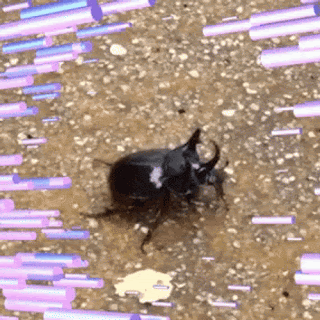Introduction:
In the enchanting realms of Northeast India, amidst the verdant hills and misty valleys, lies a culinary secret that will make your taste buds dance with delight – Xylotrupes gideon Linn, or as locals affectionately call it, the Elephant Beetle. But wait, before you raise an eyebrow or two, let me assure you, indulging in these hefty beetles isn't just about satisfying your hunger; it's about embarking on a whimsical gastronomic adventure that promises to tickle your funny bone and nourish your soul.
1. Unveiling the Culinary Curiosity: Meet the Elephant Beetle
Picture this: a robust beetle with a glossy black exoskeleton and a pair of formidable horns that could rival even the grandest of tusks. That's right, we're talking about none other than the Xylotrupes gideon Linn, a creature that looks like it stepped straight out of a prehistoric saga and onto your dinner plate. But fear not, dear reader, for beneath that intimidating exterior lies a treasure trove of culinary delights waiting to be discovered.
Now, you might be wondering, how does one go about acquiring such a peculiar delicacy? Well, in Northeast India, it's all about embracing the wild and venturing into the dense jungles in search of these majestic creatures. Armed with nothing but sheer determination and perhaps a trusty net or two, intrepid foragers set out on a quest to capture the elusive Elephant Beetle, navigating through tangled vines and dodging the occasional leech with equal parts skill and gusto.
3. A Feast for the Senses: Exploring the Culinary Charms of Xylotrupes gideon Linn
Once captured, the Elephant Beetle undergoes a transformation worthy of a culinary masterpiece. From sizzling on the grill to simmering in a spicy curry, there's no shortage of ways to prepare this delectable delicacy. And oh, the flavors! Imagine a symphony of textures and tastes – crispy on the outside, succulent on the inside, with just a hint of earthiness that transports you to the heart of the jungle with every bite. It's a feast for the senses like no other, guaranteed to leave you craving for more.
4. The Quirky Side of Health Benefits: Embracing the Nutritional Nuances
Now, let's talk about the elephant in the room – or should I say, the beetle? While it may seem unconventional, consuming Xylotrupes gideon Linn actually offers a surprising array of health benefits. Rich in protein, vitamins, and minerals, these beetles provide a nourishing boost that fuels both body and soul. And let's not forget the laughter – because really, what's more therapeutic than sharing a hearty chuckle with friends over a plate of beetle curry?
5. Beetle Mania: A Cultural Phenomenon
In Northeast India, the Elephant Beetle isn't just a food item; it's a cultural phenomenon that brings communities together in celebration of nature's bounty. Whether it's a festive gathering or a casual evening with loved ones, the presence of Xylotrupes gideon Linn on the menu is a cause for joy and merriment. And with each bite, a sense of camaraderie and connection is forged, creating memories that last a lifetime.
1. Rich in Protein:
2. High in Essential Nutrients:
4. Promotes Digestive Health:
5. Boosts Immune System:
Conclusion: A Bug's Life, A Gourmet Adventure
As we bid adieu to our whimsical journey through the culinary landscape of Northeast India, one thing becomes abundantly clear – consuming Xylotrupes gideon Linn isn't just about filling your stomach; it's about embracing the magic of gastronomy in all its quirky glory. So, the next time you find yourself in this enchanting corner of the world, don't hesitate to partake in the beetle bonanza – after all, life's too short to stick to the ordinary.
Why should we consider eating insects (entomophagy)?
Entomophagy offers a sustainable protein source that requires fewer resources such as land, water, and feed compared to traditional livestock. Insects are highly nutritious, rich in protein, healthy fats, vitamins, and minerals. Embracing entomophagy can help address food security and environmental challenges.
Are all insects safe and suitable for consumption?
Not all insects are safe for consumption, as some may carry toxins or pathogens harmful to humans. However, many edible insect species have been identified and consumed safely for centuries across various cultures. It's crucial to source insects from reputable suppliers and ensure they are raised and prepared in hygienic conditions to mitigate any health risks.
How can insects be incorporated into our diets?
Insects can be incorporated into diets in various ways, including as whole insects, ground into flour for baking, or processed into products like protein bars and snacks. They can also be cooked and seasoned to suit different culinary preferences. As awareness of entomophagy grows, innovative recipes and products are emerging, making it easier for individuals to incorporate insects into their diets seamlessly.



.png)




